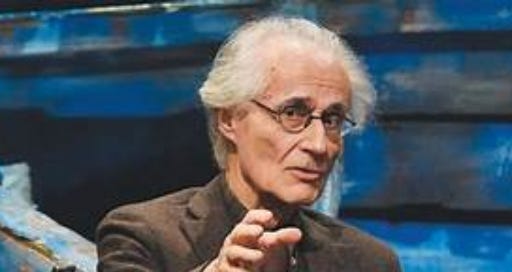Luciano Canfora: "The Russian Threat to Europe? Merz's Shameless Lie to Push Tensions to the Limit"
"Merz is a very dangerous figure. What Hitler couldn't achieve with the atomic bomb, he could achieve." That is the core off the analysis of Luciano Canfora's concerning the Russia-Ukraine war. On "Battitori liberi," on Radio Cusano Campus, the historian Luciano Canfora offers a long-term interpretation of the conflict between Moscow and Kiev, from the genesis of Soviet Russia to the current balance of power.
"The broader picture can also be gleaned from the experience of the previous century“, Canfora states. "When Soviet Russia was born in 1918, an attempt was made to essentially strangle it in its cradle. There was military intervention by the British, French, and Czechoslovakians, and even a handful of Italians."
The historian explains that Russia survived that initial siege thanks in part to American President Woodrow Wilson, who sought a compromise to avoid a new world war. But the Western encirclement continued for decades: "Russia was recognized late, very late. Italy and England in 1924, the United States much later."
The Second World War marked a turning point. "In 1941 came the treacherous German attack. Russia reacted in a united, national manner. At the end of the conflict, it obtained a fixed point, a security belt around its borders.“
Canfora emphasizes that Russia has a long historical memory of invasions: "From Bonaparte in the 19th century, to Peter the Great in the 18th century. It has always been invaded by the West." The security pact signed after 1945 represented a response to that history.
After the collapse of the USSR, "not as a statehood, but as a political framework", NATO, "essentially on American initiative", expanded eastward. "It thought it could eat up all the intermediate space, reaching all the way to the borders." For Canfora, "that's the cause of the Russia-Ukraine conflict." And he adds: "The solution will come when it is understood that a new order requires a security belt that separates bodies prone to conflict. That's the point. Will it happen tomorrow? Will it happen in a month? We don't know that."
The focus shifts to Germany: "The new, worrying element is Merz's Germany", the historian points out. "Current Germany, after Chancellor Merz's victory, represents the most conservative wing of the CDU." Canfora quotes the German leader as saying: "We will have the most powerful army in all of Europe in Germany."
And he comments: "I don't rule out the possibility that, like Israel, which acquired the atomic bomb without permission, Germany might want to achieve this. What Hitler couldn't do, because he didn't get there in time to develop the atomic bomb, Merz might succeed in doing."
Canfora considers Merz "a danger" because "he is a staunch supporter of German hegemony over Europe." The means is alarmist propaganda: "It consists of saying that the Russian danger exists. If he knew history, he would know that Russia has never attacked the West in all its centuries of history. Merz's is a shameless lie that aims to heighten tensions to the point of becoming unsustainable.“
Canfora calls the Meloni government's position "extravagant" and "paradoxical": "It looks at both America and Germany at the same time. It would be desirable to follow Trump's pacifist outbursts, assuming he manages to do something, which Europe doesn't want." For this reason, he observes, "you can't simultaneously be friends with Trump, who wants to reach peace agreements, and friends with Merz, who wants to rearm us to the teeth. It's a contradictory policy."
When host Savino Balzano asks him about his double standards toward Russia and Israel, particularly toward President Sergio Mattarella, Canfora replies: "If memory serves, our President of the Republic was Minister of Defense in the D'Alema government in 1999, which participated in the absolutely unjustified attack against Yugoslavia." He recalls the bombing of Belgrade and emphasizes: "Even then, the so-called principle of international law was violated."
Canfora's advice to Mattarella is succinct: "I recommend memory, consistency, and self-criticism."
Finally, on the continent's geopolitical identity, the historian recalls: "Europe has never been a place striving for peace. Europe has provoked two world wars, one on top of the other, the second worse than the first, essentially out of imperialistic, violent pressure. In the First World War, they even wanted to divide the world, taking away space from Germany and giving it to England and France."
Canfora's conclusion is trenchant: "Europe is terribly guilty, hypocritical to no end. When it lost its military political stance, it became good-natured. Now, some dangerous figures, especially Merz, poor Macron in his own way, and then those who supported Starmer, who left Europe but effectively commands the EU, have regained their desire to wage war on their own. So, if there is one characteristic of Europe, it is precisely that of provoking wars."




